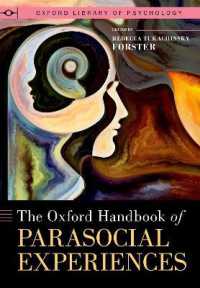Full Description
The disengagement of recent academic biblical study from church and synagogue has been widely noted. Even within the discipline, there are those who suggest it has lost its way. As the discipline now stands, is it mainly concerned with studying and listening to the texts, or with dissecting them in order to examine hypothetical sources or situations or texts that might lie behind them. Christopher Bryan seeks to address scholars and students who do not wish to avoid the challenges of the Enlightenment, but do wish to relate their work to the faith and mission of the people of God. Is such a combination still possible? And if so, how is the task of biblical interpretation to be understood?
Bryan traces the history of modern approaches to the Bible, particularly "historical criticism," noting its successes and failures--and notably among its failures, that it has been no more able to protect its practitioners from (in Jowett's phrase) "bringing to the text what they found there" than were the openly faith-based approaches of earlier generations.
Basing his work on a wide knowledge of literature and literary critical theory, and drawing on the insights of the greatest literary critics of the last hundred years, notably Erich Auerbach and George Steiner, Bryan asks, what should be the task of the biblical scholar in the 21st century? Setting the question within this wider context enables Bryan to indicate a series of criteria with which biblical interpreters may do their work, and in the light of which there is no reason why that work cannot relate faithfully to the Church. This does not mean that sound biblical interpretation can ignore the specificity of scientific or historical questions, or dragoon its results into conformity with a set of ecclesial propositions. It does mean that in asking those questions, interpreters of the biblical text will not ignore its setting-in-life in the community of faith; and they will concede that although textual interpretation has scientific elements, it is finally an exercise in imagination: an art, and not a science.
Contents
Contents ; I. The Division ; II How Did We Get Here? ; III. Why Jowett's Project was Impossible ; IV. The Hermeneutic of Suspicion ; V. So What Do We Do? ; VI. The First Task: Listening to the Individual Voices ; VII. A Digression: "Great Literature?" ; VI. The Second Task: Relating the Parts to the Whole ; 1. The Rule of Faith and the Question of History. ; 2. The Different Voices and Their Different Accounts of the History ; VII. The Third Task: So What Now? ; 1. Why We Must Ask the Question ; 2. The Scriptures as Interpretative Narrative ; 3. The Exercise of Christian Imagination ; VIII. The Drama of the Word ; Epilogue ; Appendix (by David Landon): Speaking the Word: A Guide to Liturgical Reading ; Selected Bibliography ; Notes ; Index





